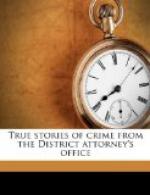VI
A Study in Finance
“He that maketh haste to be rich shall not be
innocent.”
—PROVERBS 28:20.
The victim of moral overstrain is the central figure in many novels and countless magazine stories. In most of them he finally repents him fully of his sins past and returns to his former or to some equally desirable position, to lead a new and better life. The dangers and temptations of the “Street” are, however, too real and terrible to be studied other than in actuality, and the fall of hundreds of previously honest young men owing to easily remedied conditions should teach its lesson, not only to their comrades, but to their employers as well. The ball and chain, quite as often as repentance and forgiveness, ends their experience.
No young man takes a position in a banking-house with the deliberate intention of becoming an embezzler. He knows precisely, as well as does the reader, that if he listens to the whisper of temptation he is lost—and so does his employer. Yet the employer, who would hold himself remiss if he allowed his little boy to have the run of the jam-closet and then discovered that the latter’s lips bore evidence of petty larceny, or would regard himself as almost criminally negligent if he placed a priceless pearl necklace where an ignorant chimney-sweep might fall under the hypnotism of its shimmer, will calmly allow a condition of things in his own brokerage or banking office where a fifteen-dollars-a-week clerk may have free access to a million dollars’ worth of negotiable securities, and even encourage the latter by occasional “sure” tips to take a flyer in the market.
It is a deplorable fact that the officers of certain companies occasionally “unload” undesirable securities upon their employees, and, in order to boom or create a “movement” in a certain stock, will induce the persons under their control to purchase it. It would be a rare case in which a clerk who valued his situation would refuse to take a few shares in an enterprise which the head of the firm was fathering. Of course, such occurrences are the exceptions, but there are plenty of houses not far from Wall Street where the partners know that their clerks and messengers are “playing the market,” and exert not the slightest influence to stop them. When these men find that they and their customers, and not the clerks and messengers, are paying the loss accounts of the latter, they are very much distressed, and tell the District Attorney, with regret, that only by sending such wicked and treacherous persons to State’s prison can similar dishonesty be prevented.
Not long ago the writer became acquainted with a young man who, as loan clerk in a trust company, had misappropriated a large amount of securities and had pleaded guilty to the crime of grand larceny in the first degree. He was awaiting sentence, and in connection therewith it became necessary to examine into the conditions prevailing generally in the financial district. His story is already public property, for the case attracted wide attention in the daily press; but, inasmuch as the writer’s object is to point a moral rather than adorn a tale, the culprit’s name and the name of the company with which he was connected need not be given.




